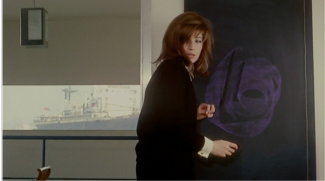Red Desert (Michelangelo Antonioni, 1964): Italy | France
Reviewed by Alicia Huhn. Viewed at the TLC Chinese Theater in Hollywood at American Film Institute’s AFIFEST 2017.
Monica Vitti plays is a charming beautiful young wife and mother, Giuliana, who is lost and confused. The confusion or weakness is set about by a recent car accident according to her husband. In appearance and class Ms. Vitti reminds me of Barbara Streisand, even cuter. The Italian language and culture of the film has a Mise-en-scene that is culturally romantic to watch, even the barren, boring industrial setting keeps attention, due it is slightly bizarre enough landscape, to keep me guessing.
On the ship drawing on a chalkboard.Giuliana is distracted and appears frazzled, the son asks for a bed time story and she replies I’ve told you all I know. He asks for one with a kite. Even though she would rather be distracted by her personal art therapy on the board, she is affectionate and endearing to the boys plea for affection and drifts into a storytelling. Ironically Giuliana tells the story of a young girl escaping to a beautiful tropical island paradise, the young girl is bored with adults, “who scared her” and not liking, “boys who pretend to be grownups”. The mother tells a very romantic creative tale of an island paradise where although the child was all alone, was also able to relax and swim and lay in the sand and be free hinting at what really matters to her even now. Rose colored sand is mentioned and the transparent water in the tale. The director shows where Giuliana would rather be, with vivid color on screen the enchanting journey of the the beautiful brown skinned adolescent playing by the beautiful sea shore. She speaks of an adventurous sail boat…” not just any boat.. one that braved the storms in this world and perhaps in other worlds which reflects Giuliana’s need and ability to deal with the condition or events of life weighing on her. She is supported in the film as a female by her status in life, a refined existence, where her husbands provision is more than “adequate”. The husband loves and provides, respects her, is kind, even confides in his “trusted friend” to look after her. Yet the friend and she are weak and fall for each other. It is a very liberal portrayal of the female role in society for the time. The contrast of her softness, femininity and her current state of weakness against the harsh back drop of a rough, loud industrial plant setting illustrate the difference in the way she feels vs how society may view her from the outside. Again, the poisoning of the soil illustrating the poisoning of a beautiful creature, this woman, who otherwise would thrive, even as a, mother is poisoned by the confines of her predefined role in society. Cold poisoned seas and grey skies at the oil plant provide a visual contrast to the island scene she creates and the director beautifully depicts the island scene from Giuliana’s point of view. She is finding herself in life and her husband does what he can to guard her and give her time and freedom to heal in her own pace. She is a fortunate woman, yet as a woman has deep personal struggles with identity. This story reminds me of my favorite short story by a female author, Charlotte Perkins Gilman in the Yellow Wallpaper, written in 1892 in California. The short story is famous for illustrating the same struggle of a woman’s fragile mental state following the birth of her child. In this 1964 Red Desert the husband appears to be more forgiving and kind. Whereas the husband in, The Yellow Wallpaper inspite of being a doctor is not able to help and the woman does not survive, she goes completely mad. This film provides hope for the woman exploring her options in 1964 hope that did not exist in t 1892. Both stories are indicative of the struggle women find themselves in literally “dying” to break free from the confines of their prescribed roles as women in society.
About this entry
You’re currently reading “Red Desert (Michelangelo Antonioni, 1964): Italy | France,” an entry on Student Film Reviews
- Published:
- 11.19.17 / 4pm
- Category:
- AFI Filmfest 2017, Films

No comments
Jump to comment form | comments rss [?]